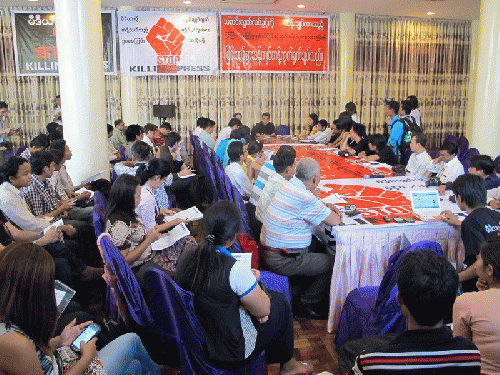
Several journalists along with the Committee For Freedom of Press (Myanmar) gathered at a media workshop at the Yuzana Garden Hotel in Yangon on 12 March calling the government to revoke the draft Printing and Publishing Bill.{Photo: Committee For Freedom
(Image by Committee For Freedom of Press (Myanmar)) Details DMCA
Several journalists along with the Committee For Freedom of Press (Myanmar) gathered at a media workshop at the Yuzana Garden Hotel in Yangon on 12 March calling the government to revoke the draft Printing and Publishing Bill.{Photo: Committee For Freedom by Committee For Freedom of Press (Myanmar)
Several journalists along with the Committee For Freedom of Press (Myanmar) gathered at a media workshop at the Yuzana Garden Hotel in Yangon on 12 March calling the government to revoke the draft Printing and Publishing Bill.{Photo: Committee For Freedom of Press (Myanmar) FB}
The
media groups of Burma - Myanmar
Journalists' Association (MJA), Myanmar Journalists' Network (MJN) and Myanmar
Journalists' Union (MJU) -- have recently
protested against the draft Printing and Publishing Law drawn by Ministry of
Information (MOI) submitted to Parliament on 27 February, 2013.
Several
journalists along with the Committee For Freedom of Press (Myanmar) gathered at
a media workshop at the Yuzana Garden Hotel in Yangon on 12 March calling the
government to revoke the draft Printing and Publishing Bill.
The MOl's
draft bill systematically put up the grip of government on the print media
freedom. It made certain its supremacy to exploit on license certificates as
per revoking or fining. The clause makes
the journalists angry due to it is no different to the 1962 Printers and
Publishers Registration Law which was enacted by the late Gen. Ne Win, the
Chairman of the Revolutionary Council of the Union of Burma.
The
important point of the making of the draft bill is to base on honesty which by
other means to be transparent. It was the practice of the dictatorial regime to
run the country by way of undisclosed mechanism. Currently, most journalists believe
that the MOI has drawn the draft behind closed doors and even without
consulting the interim press council it hurried up submitting the bill to the
House.
The act
of MOI was a kind of dishonest activity. Why? There was a promise of MOI that
the task of drawing a media law draft should be implemented by the interim
press council.
An
interim press council was reshaped on 17 September 2012, at the Chatrium Hotel
in Yangon. It emerged as a substitution for Myanmar Core Press Council. Since
the majority of media personnel rejected the formation of MCPC, the lately founded
press council appeared. The latest "interim press council' was formed by
referencing international standard of "Co-regulatory System', as mentioned on
the website of the Ministry of Information.
According
to earlier news, the interim Press Council has been assigned drafting a code of
conduct and to offer its input in rewriting a draft media law proposed by the
Information Ministry. Most journalists believe that press council members'
major responsibility would be helping to draft the press law. But now, to everyone's astonishment,
the authority uncover "Printing and Publishing
Enterprise Law Draft Bill' in their newspapers without seeking advice
from the stakeholders of the press. The move seems to cause misdemeanor towards
the media personnel including the frontline journalists.
According to a report on 12 March
by the Eleven Media Group's: "They (the
President Office) themselves formed the Press Council (Interim). Also, the
Information Minister himself told the press council to redraft the media law
from zero draft. Now they tricked us and submitted the Printing and Publishing
bill to the Parliament after drafting it in a rush. This seems to overstep the
authority (of the press council)," said a member of the press council, who
requested not to be named.
"The
Press Council (Interim) was formed under the arrangement of the President
Office, in cooperation with the Ministry of Information, so they have the
responsibility. Now, they still haven't replied to our letter of objection. I
feel that both the President and the Information Minister are not gentlemen," he added.
More complicated
question is that the MOI's draft bill included radio and television plus Internet-based
media excepting print media. So, observers think the MOI has trespassed beyond
the boundary of print media sphere.
The MOI's draft law, which planned
swap over the 1962 publishing law, provides the regime's information ministry wide-ranging
powers to call off publishing licenses, control press competence and charge
journalists as running against the state's safety measures.
The most debatable part of the
draft bill is "5 restrictions' states visibly in the "chapter 3'. In brief,
chapter three refers not to print or publish issues concerning
incitements to racial and religious hatred; agitations to damage law and order,
fueling riots; immoral sexual related matters; supporting violence and crimes,
gambling, drugs and methamphetamine interconnected unlawful activities;
writings against the current constitution and existing laws. Many journalists
consider the 5 restrictions as suppressive rubber band prescriptions.
The draft law also allows to assign
a new "registration administrator," who will oversee with issuing
publishing licenses and scrutinizing the press whether media personnel violate odd
restriction regulations.
The
draft law recommends fining unlawful or unlicensed publishing with a penalty of
1 million kyats (US$ 1,177) to 5 million kyats (US$ 5,882) or six months
imprisonment.
(Note: You can view every article as one long page if you sign up as an Advocate Member, or higher).





